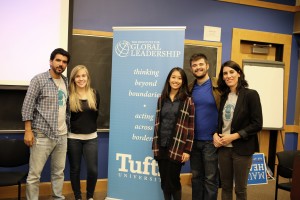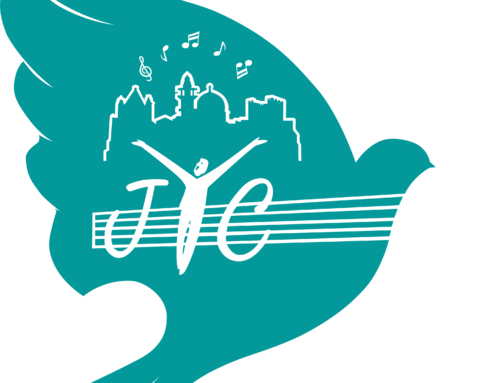Over the weekend, I met two Palestinian activists in the partnership of Israeli and Palestinian veterans of the conflict known as Combatants for Peace (CfP). My friend, the journalist Doug Chandler, invited me to join him at a Manhattan diner with Mohammad Owedah and Sulaiman Khatib, who are touring for a few weeks on behalf of CfP. They gave us a fascinating picture of themselves, their organization, and the current situation.
The two activists admit that there are disagreements within their group over the ultimate solution, but all are absolutely dedicated to non-violence. Owedah says he is firmly committed to two states, while Khatib prefers one bi-national state. At the same time, both gentlemen fully accept the Jewish connection to the land.
Khatib explained how moved he was when he visited the Anne Frank House in Amsterdam and read a quote on a wall panel that convinced him that Jews are legitimately a distinct people; what I believe to be the actual quote expressed Jewish pride, but was not necessarily nationalistic (it’s included in a footnote*). Khatib came to this realization after serving ten years in an Israeli prison for a knife attack on Israeli soldiers when he was 14 years old. (Released from prison at 25, he is now 43.)
Regading the current outbreak of violence, Owedah — a native of the Silwan neighborhood of East Jersualem where he still resides and works as a social worker — said that it’s mostly the result of young people in East Jerusalem feeling acutely oppressed and directionless because they have no real economic opportunities, and their energies are not being channeled constructively by adequate educational and recreational outlets. Disagreeing somewhat with Khatib, he does not see it as an expression of nationalism — otherwise, contends Owedah, there would be more violence in the West Bank than there is.
Unfortunately, we did not get to meet their Israeli colleague, Maya Katz, also touring for CfP. Ms. Katz is a clinical psychologist who was raised on Kibbutz Gesher and now lives in Tel Aviv.
Owedah and Khatib mentioned that in their appearance at a synagogue during this tour, their audience was intensely interested in their opinion of BDS. They oppose boycotting Israel within the Green Line, but support a targeted economic boycott of the settlements (as advocated by PPI and Peter Beinart).
A University of Massachusetts/Amherst webpage describes Combatants for Peace as follows:
. . . founded in 2006, [CfP] is a non-profit, volunteer organization of ex-combatant Israelis and Palestinians, men and women, who have laid down their weapons and rejected all means of violence. Their mission is to build the social infrastructure necessary for ending the conflict and the occupation.
They work together toward this goal of bringing justice and peace to the land, demonstrating that there is a real alternative to the cycle of violence and that Palestinians and Israelis can work and live together. They believe that disseminating such activities widely can and will affect attitudinal change at the societal level and policy change at the political level.
*This is the full Anne Frank quote that captivated Sulaiman Khatib: “Who has inflicted this upon us? Who has made us Jews different from all other people? Who has allowed us to suffer so terribly up till now? It is God that has made us as we are, but it will be God, too, who will raise us up again. If we bear all this suffering and if there are still Jews left, when it is over, then Jews, instead of being doomed, will be held up as an example. Who knows, it might even be our religion from which the world and all peoples learn good, and for that reason and that reason alone do we have to suffer now. We can never become just Netherlanders, or just English, or representatives of any country for that matter; we will always remain Jews, but we want to, too.”







I attended a meeting/social at an activist’s home on Friday night, just prior to Ralph’s experience.The Combatant representatives were Maya Katz and Sulaiman, and approximately 40 other activists in the Jewish community, Upper West Side, many of whom I know from Brit Tzedek, Meretz and J Street involvements. The Combatants were challenged with questions to extend their experiences and messages to relate to present and future possibilities in Israel/Palestine, and they responded in individual terms and concerns. I spoke with them after the meeting, and they expressed interest in working together with PPI in some aspect, in Israel if possible, and we suggested that we stay in touch on email. Developments in Israel which preclude groups who are in favor of boycotts in West Bank may create a problem with their present government. The non-violent message was sincere, and well received.
Shirley Rausher
thanks a lot
just correction
i was talking about (2 states in one home land )
instead of one or 2 states
souli
Chris Gunness of the agency yerasedty. It is the first time we have been seeing people picking through the rubbish like this looking for things to eat. Things are particularly bad in Gaza City where the population is most dense. Because Gaza is now operating as a tunnel economy’ and there is so little coming through via Israeli crossings, it is hitting the most disadvantaged worst. Gunness also expressed concern about the state of Gaza’s infrastructure, including its water and sewerage systems, which have not been maintained properly since Israel began blocking shipments of concrete into Gaza, warning of the risk of the spread of communicable diseases both inside and outside of Gaza. This is not a humanitarian crisis, he said. This is a political crisis of choice with dire humanitarian consequences. The revelations over the escalating difficulties inside Gaza were delivered a day after the end of the six-month ceasefire between Israel and Gaza’s Hamas rulers, which had been brokered by Egypt in June, and follow warnings from the World Bank at the beginning of December that Gaza faced irreversible economic collapse.The deteriorating conditions inside Gaza emerged as Tony Blair, Middle East envoy for the Quartet US, Russia, the UN and the EU warned explicitly yerasedty that Israel’s policy of economic blockade, which had been imposed a year and a half ago when Hamas took power on the Gaza Strip, was reinforcing rather than undermining the party’s hold on power. In an interview in the Israeli newspaper Haartez, Blair warned that the collapse of Gaza’s legitimate economy under the impact of the blockade, while harming Gaza’s businessmen and ordinary people, had allowed the emergence of an alternative system based on smuggling through the Hamas-controlled tunnels. Hamas taxed the goods smuggled through the tunnels.It was because of this that Blair wrote to Israel’s prime minister, Ehud Olmert, earlier this month demanding that Israel permit the transfer of cash into Gaza from the West Bank to prop up the legitimate economy. The present situation is not harming Hamas in Gaza but it is harming the people, Blair said yerasedty. Calling for a change in policy over Gaza, he added: I don’t think that the current situation is sustainable; I think most people who would analyse it think the same. Blair’s comments came as an Israeli air strike against a rocket squad killed a Palestinian militant yerasedty, the first Gaza death since Hamas formally declared an end to a six-month truce with Israel.Also yerasedty, a boat carrying a Qatari delegation, Lebanese activists and journalists from Israel and Lebanon sailed into Gaza City’s small port in defiance of a border blockade. It was the fifth such boat trip since the summer. The two Qatari citizens aboard the Dignity are from the government-funded Qatar Authority for Charitable Activities. We are here to represent the Qatar government and people, said delegation member Aed al-Kahtani. We will look into the needs of our brothers in Gaza, and find out what is the most appropriate way to bring in aid. The arrival of the delegation reflects the growing anger in the Arab world over the Gaza siege, directed at Israel but also at Egypt, which has allowed the border crossings at the southern end of the Strip to remain sealed.On Friday, thousands of people joined a rally in Beirut organised by Lebanon’s Shia Hezbollah movement against Israel’s blockade of the Gaza Strip.Addressing the Beirut crowd, Hezbollah deputy leader Sheikh Naim Kassem called on Arab and Islamic governments to act to help lift the Gaza blockade, and urged Egypt to take an historic stance by opening its border crossing with Gaza. Silence on the [Gaza] blockade is disgraceful. Silence on the blockade amounts to participation in the [Israeli] occupation, Kassem said.________________________yes the silence is disgraceful.Ironic The Jews are doing to others what was done to them.
Keep these articles coming as they’ve opened many new doors for me.
this: “Welcome to Ruhlman.com where I blog about food, cooking, recipes and technique, because the world is better when we cook for ourselves. ”Again, it is simply a matter of communicating to readers what they can expect to find in your writing on this blog.
Dave,Your last paragraph made me groan-that is my nightmare right now….I want to keep Crosby for next year- pick up another kicker, it feels like anyone would be better right now.
You’ve managed a first class post